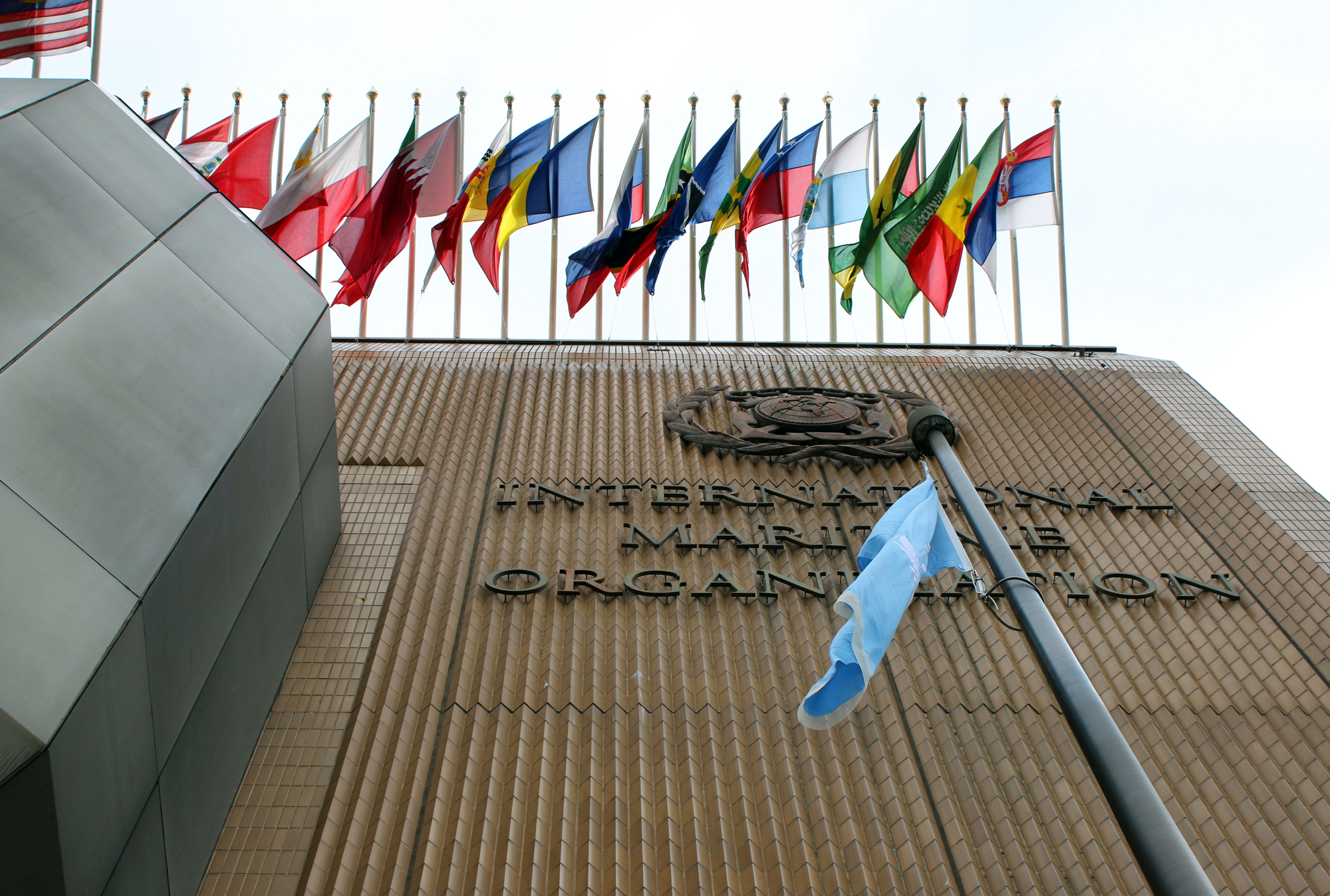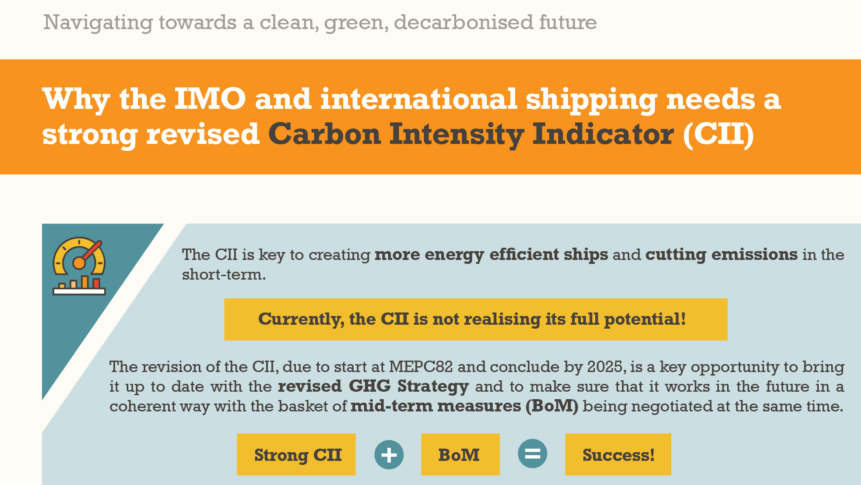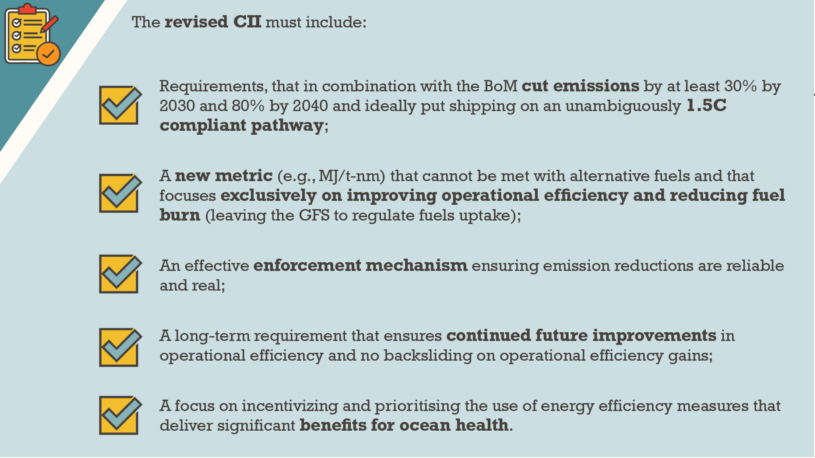UN agrees on a new climate plan for global shipping, but not 1.5°C aligned

7 July 2023 – Civil society groups are deeply concerned by the UN’s International Maritime Organization (IMO) failure to firmly align global shipping with the Paris Agreement’s 1.5°C temperature-warming limit, at the 80th Marine Environment Protection Committee meeting (MEPC 80) this week.
The IMO’s 175 member states failed to agree on absolute emission reduction targets for 2030 and 2040, but instead identified “indicative checkpoints” of at least 20%, striving for 30% emission reduction by 2030, and at least 70%, striving for 80% reduction by 2040. The strategy also aims to reach only net-zero “by or around, i.e., close to 2050”, depending on “national circumstances”.
While this brings shipping closer to the Paris Agreement’s temperature goal than before, thanks to the impressive efforts of the Pacific Island countries to push for higher ambition, it is far from sufficient to ensure shipping contributes its fair share to limiting the global temperature rise to 1.5°C, which would require emissions to halve by 2030 and reach zero by 2040, and will see shipping exceed its 1.5°C carbon budget between 2032 and 2033.
This agreement is the latest example of a pattern of behaviour at the IMO, where climate and environment issues are addressed but not adequately responded to, and raises further questions about the institution’s suitability as a venue for tackling shipping’s serious impact on the climate and oceans. With negotiations undertaken behind closed doors and without all stakeholders or the media having the possibility to be in the room, it also raises serious concerns about the IMO’s institutional transparency.
The MEPC 80 agreement makes the case for a “coalition of the willing” disappointed with the weak ambition to push for further action, including at national, regional and industry level, to advance shipping’s 1.5°C transition. This must include:
- 1.5°C-aligned emission cuts: New regulations must be introduced and existing ones tightened to bring emissions down as soon as possible. This includes incentives to roll-out of wind technologies, green fuel mandates to drive the uptake of zero-emission solutions, action on short-term climate pollutants such as methane and black carbon, mandatory slow-steaming, and the inclusion of shipping in national carbon markets. The EU’s ( ETS) and the UK’s emission trading for shipping, as well as the EU’s marine fuels standard (FuelEU Maritime) sets an example for other countries and regions to follow.
- Equitable transition: Global and regional shipping levies, on a 1.5°C-aligned basis and of at least $100 per tonne of greenhouse gas emissions, are essential for generating vital climate finance to support vulnerable countries (especially SIDS and LDCs) and ensure an equitable transition in the industry.
- Industry cooperation: The shipping industry has made clear a 1.5°C-aligned transition is achievable, and it must increase its efforts to meet this target in the absence of IMO’s leadership. Shipping companies, green technology producers and investors need to ramp up investments in wind propulsion, green hydrogen, and other alternative energy solutions. Public and private cooperation on setting up more green shipping corridors will also be important.
- Include shipping in NDCs: Countries must take responsibility for their shipping emissions at COP28 as part of their Nationally Determined Contributions (NDCs) under the Paris Agreement.
John Maggs, Clean Shipping Coalition, said: “There is no excuse for this wish and a prayer agreement. They knew what the science required, and that a 50% cut in emissions by 2030 was both possible and affordable. Instead the level of ambition agreed is far short of what is needed to be sure of keeping global heating below 1.5ºC and the language seemingly contrived to be vague and non-committal. The most vulnerable put up an admirable fight for high ambition and significantly improved the agreement but we are still a long way from the IMO treating the climate crisis with the urgency that it deserves and that the public demands.”
Faig Abbasov, Transport & Environment, said: “Aside from FIFA, it’s hard to think of an international organisation more useless than the IMO. This week’s climate talks were reminiscent of rearranging the deckchairs on a sinking ship. The IMO had the opportunity to set an unambiguous and clear course towards the 1.5ºC temperature goal, but all it came up with is a wishy-washy compromise. Fortunately, states like the US, UK and the EU don’t have to wait for China, Brazil and Saudi Arabia to act. Ambitious national policies and green shipping lanes can have a global impact. It’s time to think globally, act locally.”
Lucy Gilliam, Seas At Risk, said: “There is a real sinking feeling in the IMO. This agreement does not address the climate crisis or meet 1.5 limits. In typical IMO fashion there was delay tactics in working groups while the real inaction happened behind closed doors where many were excluded until the final hour and in front of a near ultimatum. The Pacific’s brought it back from the brink. But let’s be clear that this was not transparent, just or equitable and it is reflected in the result reached. What’s especially egregious is that we have the know-how to tackle this crisis. We also know that action will be far cheaper than inaction! The solutions exist yet once again IMO is failing to act with the urgency that dealing with the climate crisis requires. Another example to add to our recently published shipping SOS report which catalogues 50 years of failure to address the environmental impact of shipping. We will need others to step up and man the lifeboats if we are to shift and rescue a 1.5 aligned course”
Delaine McCullough, Ocean Conservancy, said: The climate emergency demands an international response, but the IMO’s struggle to set a GHG Strategy this week that adequately responds to the climate emergency raises questions of whether the organisation ultimately is up for the task. While the new GHG strategy nearly doubles the long-term ambition over the initial 2018 strategy, the checkpoints for 2030 and 2040 that were finally agreed to fall short of what is needed to ensure a warming limit of 1.5C. Thankfully, the Marshall Islands, Vanuatu and other small island states were able to secure stronger checkpoints, but the IMO must do better and others will need to step in. We now more than ever need immediate reductions and forceful national and regional policies and investments to keep us on a 1.5C route.”
Madeline Rose, Pacific Environment, said: “Nations failed this week to put the global shipping industry on a credible 1.5oC decarbonization pathway. While the inclusion of 2030 and 2040 emissions reduction targets for shipping is not insignificant — and we commend the Republic of Marshall Islands and Vanuatu for their tireless diplomacy to hold them — this Strategy will see the shipping industry exhaust its 1.5oC carbon budget by 2032. Fortunately, major maritime nations, ports, and companies can still act to fully decarbonize ocean shipping by 2040 – and that’s what we’ll be pushing them to do.”
Daniele Rao, Carbon Market Watch, said: “The way the International Maritime Organisation has watered down its climate ambition will sink the shipping sector’s chances of meeting its Paris Agreement commitments. Due to this failure, we need ambitious countries and blocs to chart their own course and set carbon levies at national and regional level of at least $100 per tonne of greenhouse gas emissions.”
Background information:
The IMO revised its strategy at the MEPC 80 summit on 3-7 July. Around 32 countries led by Pacific Island states, the US, the UK, Canada pushed for climate-science based emission reduction by 2030 and 2040. Around 16 countries led by China, Argentina and Brazil, resisted 1.5°C-aligned action on shipping.
While the IMO agreed on an ambition to cut emissions by 2030, it has not yet adopted any “mid-term” measures able to achieve this. The timeline proposed for these measures, including green fuel mandates and “pricing of greenhouse gas emissions” (a levy), would only see them come into force in 2027, which is too late to achieve the 2030 indicative checkpoint. Key will be the revision of the IMO’s short-term greenhouse gas measure (the CII), whose ambition for 2027-2030 must urgently be reviewed to ensure that emissions fall steeply within this decade.
This press release is issued by:
- John Maggs, Clean Shipping Coalition: jmaggs@seas-at-risk.org
- Lucy Gilliam, Seas At Risk: lgilliam@seas-at-risk.org
- Faig Abbasov: Transport & Environment: faig.abbasov@transportenvironment.org
- Delaine McCullough, Ocean Conservancy: dmccullough@oceanconservancy.org
- Madeline Rose, Pacific Environment: mrose@pacificenvironment.org
- Daniele Rao, Carbon Market Watch: daniele.rao@carbonmarketwatch.org


